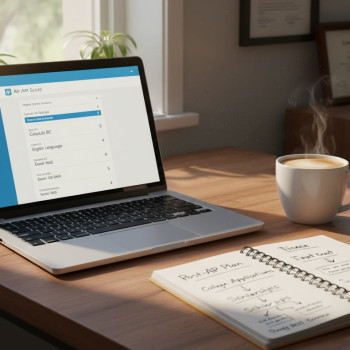Why APs Matter for Villanova-Bound Business and Engineering Students
If you’re aiming for Villanova — whether you’re drawn to the Villanova School of Business or one of its engineering pathways — Advanced Placement (AP) classes are one of the best tools in your academic toolkit. They show admissions officers you can handle college-level work, let you build a stronger first-year schedule, and free up space later for internships, minors, or deeper major-specific coursework.
This guide is written for students and parents who want a clear, human, practical plan: which APs to take, how to sequence them, realistic score goals, study strategies, and how to turn APs into a competitive advantage for Villanova applications. We’ll include sample timelines, a comparison table, and helpful study notes — and sprinkle in natural suggestions for Sparkl’s personalized tutoring where it fits best.

Start with the End in Mind: What Villanova Looks For
Villanova values academic rigor, demonstrated interest in your chosen field, and students who show initiative beyond the classroom. For Business and Engineering hopefuls, that means:
- Challenging coursework (APs where available)
- Strong grades in math and science for engineering; math, economics, and quantitative courses for business
- Relevant extracurriculars (robotics, finance club, internships, community-service projects with a leadership element)
- Thoughtful essays and recommendations that connect your AP experience to real interests
APs are evidence — not proof — of readiness. High AP scores help, but so do the stories you pair with them: how you applied what you learned, projects you completed, and how those experiences shaped your goals.
Which AP Courses Matter Most?
Below is a prioritized list of AP courses that typically matter most for Villanova applicants interested in Business or Engineering. Think of this as a prioritized shopping list rather than a rigid prescription.
- AP Calculus AB/BC — Essential. For engineering, BC is strongly recommended if available (gives deeper calculus background); for business majors, AB or BC will both be valuable.
- AP Physics (1, 2, C: Mechanics, C: E&M) — For engineers, AP Physics C (Mechanics and E&M) is the gold standard because it uses calculus. AP Physics 1 or 2 can be useful early on if C isn’t available.
- AP Chemistry — Helpful for certain engineering disciplines (chemical, materials) and shows scientific preparedness.
- AP Statistics — Powerful for both business and engineering; real-world data skills are prized.
- AP Computer Science A — Increasingly useful across engineering and business (tech-driven finance, data analysis, algorithmic thinking).
- AP Microeconomics and AP Macroeconomics — Especially relevant and persuasive for business applicants.
- AP English Language or Literature — Strong writing proves you can communicate complex ideas — invaluable in essays, recommendations, and professional life.
How Many APs Should You Take?
Quality beats quantity. At most high schools, taking 3–5 APs during junior and senior years is a solid and realistic plan. Villanova will be impressed by students who both challenge themselves and maintain strong grades. If a student can take more without grade or health deterioration — and those courses are coherent with their goals — that can also be a plus.
Sample Two-Year AP Roadmaps
Here are realistic, goal-oriented two-year plans for students who plan to pursue Business or Engineering at Villanova.
Roadmap A — Engineering-Focused (Junior + Senior Years)
- Junior Year: AP Calculus BC, AP Physics C: Mechanics, AP Chemistry or AP Computer Science A
- Senior Year: AP Physics C: Electricity & Magnetism (if available), AP Statistics, AP English Language or AP Research
Roadmap B — Business-Focused (Junior + Senior Years)
- Junior Year: AP Calculus AB or BC, AP Microeconomics, AP English Language
- Senior Year: AP Statistics, AP Computer Science A (or AP Macroeconomics), AP Research or AP Psychology
Table: APs Compared — Relevance, Difficulty, and Strategic Value
| AP Course | Best For | Typical Difficulty | Strategic Value for Villanova |
|---|---|---|---|
| Calculus AB/BC | Engineering, Business, Quantitative Majors | High (especially BC) | High — demonstrates calculus readiness |
| Physics C (Mech / E&M) | Engineering | Very High | Very High — calculus-based physics is a strong signal |
| AP Statistics | Business, Data-Focused Engineering | Moderate | High — practical, widely applicable |
| AP Computer Science A | Engineering, Business (Tech/Analytics) | Moderate to High | High — coding ability is prized |
| AP Chemistry | Certain Engineering Fields | High | Moderate — dependent on intended major |
| AP Economics (Micro/Macro) | Business | Moderate | High — directly relevant to business applications |
| AP English Lang/Lit | All majors | Moderate | High — communication skills matter in essays and leadership |
Scoring Goals and How Colleges Use AP Scores
A common benchmark is aiming for a 4 or 5 on AP exams for courses closely tied to your intended major. High scores are most helpful for:
- Placement out of introductory college courses (giving room in your first year)
- Showing mastery and readiness in a subject area
- Strengthening the rigor portion of your application
Keep in mind some APs matter more for placement than for admissions; admissions committees look primarily at the intent and rigor you demonstrate across your transcript. So if AP Physics C is available and you want engineering, a strong score there is more persuasive than, say, a fifth AP unrelated to your interests.
Study Strategies That Work — From Planning to Exam Day
AP exams reward consistent practice and deep problem-solving, not last-minute cramming. Here’s a practical plan you can follow:
- Map backwards from exam day: Break your syllabus into weekly units. Schedule topic reviews and full practice exams early enough to iterate based on weaknesses.
- Active practice over passive reading: Work problems, write timed essays, and simulate exam sections under timed conditions.
- Use past AP exams: Official past free-response questions and scoring rubrics are the best practice for understanding grader expectations.
- Mix solo study and collaborative learning: Teaching a peer or discussing hard problems in study groups often cements understanding better than solo review alone.
- Focus on fundamentals: For engineering APs, rigorous mastery of calculus and core physics principles pays off more than memorizing trick solutions.
Practical Weekly Routine
- 3–4 focused study sessions (45–90 minutes) per week per AP class during regular school months
- 1 full practice section or FRQ set every 2 weeks
- Monthly timed full-length practice exam (2–3 months before test increases to every 1–2 weeks)
- Weekly reflection log: what concept tripped you up, what tools helped, and a 15-minute plan for the next week
How to Use APs in Your Villanova Application Story
APs show you sought challenge — but the application is where you turn facts into narrative. Here are ways to weave APs into essays, activities, and recommendations:
- Connect an AP project to action: did an AP Physics lab lead you to a robotics club role or an engineering internship?
- Use AP success to demonstrate persistence: a rise from a 3 to a 5 across years can show academic growth.
- Highlight collaboration and teaching: leading study groups or tutoring younger students through AP topics showcases leadership and communication.
Admissions readers at Villanova like to see both excellence and context. Explain the how and why behind taking tougher classes: limited offerings at your school? a homegrown study routine? a mentor who inspired you? These details humanize your transcript.
When to Consider Sparkl’s Personalized Tutoring
Many students can succeed in APs with school teachers and disciplined self-study. Some students benefit from targeted, personalized support — especially when balancing multiple APs, extracurriculars, or college applications. That’s where Sparkl’s tutoring can fit in naturally:
- One-on-one guidance for problem areas (e.g., conceptual electricity and magnetism or multivariable calculus previews)
- Tailored study plans that fit your school schedule and upcoming exams
- Expert tutors who can model effective exam strategies and help you interpret AP rubrics
- AI-driven insights that identify weak topics and recommend practice sets — useful for making progress efficient as test day approaches
Think of Sparkl as a flexible supplement: not a replacement for the classroom, but a targeted resource when you need accelerated progress, focused practice, or help translating AP learning into a compelling application narrative.
Balancing APs with Well-Being and Extracurriculars
Ambition is a virtue, but burnout is real. Villanova prefers applicants who show depth, not just breadth. Here are three principles to keep balance:
- Pick a manageable course load: Challenge most in your best subjects, and choose complementary APs rather than piling on across unrelated fields.
- Keep extracurriculars meaningful: Depth — a leadership role, a sustained project, or measurable results — beats many shallow activities.
- Protect mental health: Schedule downtime, sleep, and exercise. Your best thinking happens when you’re rested and curious.
Common Questions From Students and Clear Answers
Q: Which AP scores do colleges actually see?
A: Colleges don’t see your AP scores automatically; they see your transcript and the courses you took. If you want official AP scores sent to colleges, you or your counselor must request score reports through the College Board. Strategically, high scores can help with placement and course selection after admission — and they bolster your academic story.
Q: Should I self-study an AP?
A: Self-studying can work well if you’re disciplined, have reliable resources, and can access practice exams. Consider a tutor (like those from Sparkl) for an accountability layer, concept checks, and targeted feedback on free-response practice.
Q: Can I skip introductory college courses at Villanova with APs?
A: Many colleges, including Villanova, allow placement or credit for high AP scores — but policies vary by department and change over time. Use APs primarily to demonstrate readiness; placement is a secondary, practical benefit.
Putting It All Together: A 12-Month Countdown to Test Day
Here’s a condensed checklist if you’re about a year out from your AP exams:
- 12 months: Choose APs that align with your major interest and school offerings. Begin the year with a clear schedule.
- 9 months: Start cumulative reviews and form a study group or engage a tutor for challenging subjects.
- 6 months: Begin timed practice sections and full-length practice exams every 2–3 weeks.
- 3 months: Increase full practice tests to weekly or biweekly for at least one subject; identify weak areas and target them with specific problem sets.
- 1 month: Lighten new learning; focus on review, exam technique, and physical readiness (sleep, nutrition, logistics).
- Exam week: Short reviews, calm routines, and a checklist for test materials and arrival times.
Real-World Examples: How Students Turned APs into Opportunities
Example 1: An aspiring mechanical engineer took AP Calculus BC and AP Physics C in junior year, used high AP scores to skip introductory calculus in college, and used that freed-up semester to take a materials science elective. That elective led to a summer internship and an engineering research project described in their application.
Example 2: A business hopeful combined AP Microeconomics, AP Statistics, and AP Computer Science A. They used the quantitative free space to build a small data-analysis portfolio — a set of projects analyzing local business datasets — which made a compelling personal statement and sparked a conversation with admissions about entrepreneurial initiative.
Key Takeaways
- Choose APs that align with your intended major and strengths rather than chasing impressions.
- Aim for depth: fewer APs with strong performance and integrated activities beat a long list with low impact.
- Use APs to create stories: labs, projects, clubs, and internships amplify academic signals.
- Consider targeted support like Sparkl’s personalized tutoring for tricky subjects or to maximize efficiency in the months before the exam.
- Maintain balance — colleges notice resilience, creativity, and wellbeing as much as test scores.

Final Note — Your Path Is Unique
AP classes are powerful, but they’re one chapter of a larger story. Villanova responds to applicants who show curiosity, leadership, and a clear sense of purpose. Use APs to sharpen your skills and tell a convincing narrative: what you care about, how you explored it, and where you want to go next.
If you’d like help turning your AP coursework into a tailored study plan or translating those experiences into strong application materials, consider a strategic partnership with a personalized tutor. A focused coach can help you perfect free-response techniques, identify weak spots early, and build the confidence you need to excel on test day — all while keeping your life balanced.
Good luck — and remember: steady progress and thoughtful choices beat dramatic last-minute moves. You’ve got this, and with smart planning, the Villanova dream is within reach.

















No Comments
Leave a comment Cancel